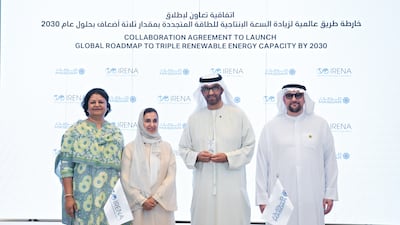Abu Dhabi’s clean energy company Masdar has signed an initial agreement with the International Renewable Energy Agency (Irena) to co-operate on a major research project that will lead to the tripling of global renewable energy capacity by 2030.
The agreement, signed on Thursday at the UAE Climate Tech forum in Abu Dhabi, is expected to provide a global baseline for renewable energy with a focus on solar, wind, hydropower, geothermal and other technology including battery storage, the two entities said in a joint statement.
The "international knowledge project" will also highlight the challenges faced by different regions in meeting their renewable energy ambitions and provide recommendations for action before Cop28 in Dubai this year.
“The world needs to commit to tripling global renewable energy capacity by 2030 and to double it again by 2040,” said Dr Sultan Al Jaber, Minister of Industry and Advanced Technology, Cop28 President-designate and chairman of Masdar.
“In the 17 years since the UAE leadership established Masdar in 2006, the cost of a kilowatt hour of solar energy has plummeted to under 2 cents and we need to harness this pioneering spirit of innovation now more than ever.”
Masdar is active in more than 40 countries and has invested in or committed to projects worth more than $30 billion.
The company aims to grow its capacity to at least 100 gigawatts of renewable energy by 2030.
Investments in renewable energy technology reached a record of $1.3 trillion last year but that figure must rise to about $5 trillion annually to meet the key Paris accord target of limiting temperature increases to 1.5 °C above pre-industrial levels, the Abu Dhabi-based agency said in its World Energy Transitions Outlook 2023 preview.
Renewable capacity must grow from about 3,000 gigawatts currently to more than 10,000 gigawatts in 2030, at an average rate of 1,000 gigawatts annually, it said.
"In 2022, a record 300 gigawatts of renewables were added and renewable power now accounts for 40 per cent of total installed generation capacity globally," Francesco La Camera, director general of Irena, said on Thursday. "Despite this progress, the energy transition is off track."
He added the transition to renewables provides a sustainable and affordable solution to many of the challenges the world faces currently and "we have the technology to deploy at speed and scale".
More investment in needed in climate technology, which can help create a new economic development model focused on cutting emissions while ensuring growth, Dr Al Jaber said this week at the UAE Climate Tech forum.
"With the right policies stimulating the right investments, climate technologies could at least double their contribution to global growth, while removing 25 billion tonnes of carbon emissions annually," he said.


